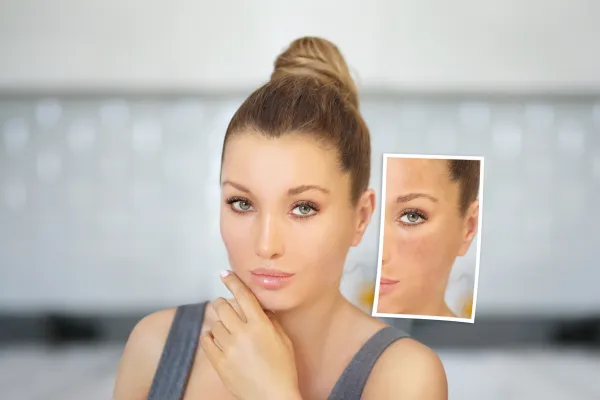CLICK HERE TO SUBSCRIBE TO OUR NEWSLETTERS.

Let us promote
your upcoming esthetic event to
The Solo Esthetician® community.
Promote your upcoming event to our community of more than 100,000 beauty professionals within our Facebook group, which includes both students and licensed estheticians. Take a look at some of the previous events we have been involved in. Seize the opportunity to connect with the esthetic audience necessary to ensure the success of your event!
We create blogs tailored for your brand's events.

Comprehensive Guide: Treating Pre and Post-Summer Hyperpigmentation

Introduction:
Summertime is a season of fun and adventure, but it can also bring challenges for individuals with hyperpigmentation concerns. As a dermatologist, I understand the importance of addressing pre and post-summer hyperpigmentation to help individuals achieve a more even and radiant complexion. In this comprehensive blog post, we will delve into the world of hyperpigmentation and explore effective treatment strategies that estheticians can utilize during the summer months. By understanding the causes and implementing targeted interventions, estheticians can help their clients enjoy a summer filled with confidence and glowing skin.

Understanding Hyperpigmentation
To effectively treat hyperpigmentation, it is essential to understand its causes. Hyperpigmentation can be triggered by various factors, including sun exposure, hormonal changes, inflammation, and skin injuries. Melanin, the pigment responsible for skin color, can become overproduced in certain areas, resulting in dark spots or patches. By identifying the underlying causes, estheticians can tailor their treatment approach accordingly.

Pre-Summer Preparation
Before the summer months begin, it's crucial to prepare the skin for potential hyperpigmentation triggers. Encourage clients to establish a comprehensive skincare routine that includes daily sun protection. Advise the use of broad-spectrum sunscreen with a high SPF, along with protective clothing and accessories. Additionally, recommend the incorporation of antioxidants and brightening agents into their skincare regimen to help prevent melanin production and reduce existing hyperpigmentation.

Sun Protection
Emphasize the importance of sun protection as a crucial step in treating hyperpigmentation during the summer. Encourage clients to reapply sunscreen every two hours, especially during prolonged sun exposure. Recommend physical sunscreens containing zinc oxide or titanium dioxide as they provide effective broad-spectrum protection. Educate clients on the harmful impact of UV rays on hyperpigmented areas and stress the significance of sun-protective measures such as hats and sunglasses.

Gentle Exfoliation
Exfoliation plays a vital role in treating hyperpigmentation. However, caution should be exercised during the summer months to prevent further skin damage. Recommend gentle exfoliation methods such as enzymatic or chemical exfoliants that target hyperpigmentation without causing excessive skin sensitivity. Advise clients to avoid harsh physical exfoliation, as it may aggravate the skin and increase the risk of post-inflammatory hyperpigmentation.

Topical Treatments
Estheticians can recommend topical treatments to address hyperpigmentation during the summer. Ingredients such as hydroquinone, kojic acid, retinoids, and vitamin C have shown efficacy in reducing melanin production and promoting a more even skin tone. Advise clients on the proper usage and duration of these treatments, as well as the importance of consistent application and sun protection.

Professional Treatments
In addition to at-home skincare, professional treatments can significantly enhance the results of hyperpigmentation treatment. Chemical peels, microdermabrasion, and laser therapies can help accelerate the fading of hyperpigmented areas. Collaborate with experienced dermatologists to determine the most suitable treatment options for your clients' specific needs and skin type. Ensure proper post-treatment care and follow-up to maximize the benefits and minimize potential side effects.

Post-Summer Care
After the summer months, clients may experience an exacerbation of hyperpigmentation due to increased sun exposure. Advise clients to continue using sun protection and adjust their skincare routine accordingly. Incorporate ingredients such as niacinamide, azelaic acid, and licorice extract into their post-summer skincare regimen to further address hyperpigmentation and promote skin renewal.

Maintenance and Long-Term Strategies
Hyperpigmentation treatment requires a long-term approach. Encourage clients to maintain a consistent skincare routine even after the summer months have passed. Stress the importance of regular follow-up visits to monitor progress and make necessary adjustments to their treatment plan. Consider recommending lifestyle modifications, such as stress management and a healthy diet, as these factors can influence skin health and pigmentation.

Conclusion:
As summer approaches, estheticians play a crucial role in helping clients address pre and post-summer hyperpigmentation concerns. By understanding the causes of hyperpigmentation, implementing sun protection measures, incorporating gentle exfoliation, and utilizing topical and professional treatments, estheticians can guide their clients towards achieving a more even and radiant complexion. Remember, a comprehensive approach and long-term commitment are key to successful hyperpigmentation treatment. Together, let's help our clients embrace the summer months with confidence and a renewed sense of skin health.
Resources for Hyperpigmentation:
Join The Solo Esthetician Community inside our Facebook Group. Click here for Students. Click here for Professionals.

Cheers to your success,
KimBella
Founder, The Solo Esthetician
Subscribe to TSE YouTube
Office: Atlanta, GA
www.thesoloesthetician.com
Stay In The
Industry Know
Newsletter
Subscribe to stay in the industry know and Connect, Save, and Grow!

Copyright 2025. All rights reserved.




















